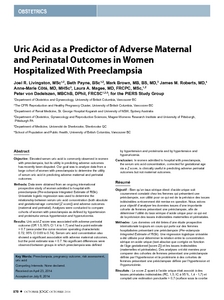Livingston, JR; Payne, B; Brown, M; Roberts, JM; Côté, AM; Magee, LA; von Dadelszen, P
(2014)
Uric Acid as a predictor of adverse maternal and perinatal outcomes in women hospitalized with preeclampsia.
Journal of Obstetrics and Gynaecology Canada, 36 (10).
pp. 870-877.
ISSN 1701-2163
https://doi.org/10.1016/S1701-2163(15)30435-7
SGUL Authors: von Dadelszen, Peter
![[img]](https://openaccess.sgul.ac.uk/107516/1.hassmallThumbnailVersion/livingston%20-%20jogc%20-%20piers%20uric%20acid%20-%202014.pdf)  Preview |
|
PDF
Published Version
Available under License ["licenses_description_publisher" not defined].
Download (376kB)
| Preview
|
Abstract
OBJECTIVE: Elevated serum uric acid is commonly observed in women with preeclampsia, but its utility in predicting adverse outcomes has recently been disputed. Our goal was to analyze data from a large cohort of women with preeclampsia to determine the utility of serum uric acid in predicting adverse maternal and perinatal outcomes. METHODS: Data were obtained from an ongoing international prospective study of women admitted to hospital with preeclampsia (Pre-eclampsia Integrated Estimate of RiSk). Univariate logistic regression was used to determine the relationship between serum uric acid concentration (both absolute and gestational-age corrected [Z score]) and adverse outcomes (maternal and perinatal). Analyses were conducted to compare cohorts of women with preeclampsia as defined by hypertension and proteinuria versus hypertension and hyperuricemia. RESULTS: Uric acid Z score was associated with adverse perinatal outcome (OR 1.5; 95% CI 1.4 to 1.7) and had a point estimate > 0.7 (area under the curve receiver operating characteristic 0.72; 95% CI 0.69 to 0.74). Serum uric acid concentration also showed a significant association with adverse maternal outcomes, but the point estimate was < 0.7. No significant differences were observed between groups in which preeclampsia was defined by hypertension and proteinuria and by hypertension and hyperuricemia. CONCLUSION: In women admitted to hospital with preeclampsia, the serum uric acid concentration, corrected for gestational age via a Z score, is clinically useful in predicting adverse perinatal outcomes but not maternal outcomes.
| Item Type: |
Article
|
| Additional Information: |
© 2014 Society of Obstetricians and Gynaecologists of Canada. Published by Elsevier Inc. All rights reserved. Made available with permission from the publisher. Contact publisher for any further re-use. |
| Keywords: |
preeclampsia, pregnancy outcome, risk assessment, uric acid, Adult, Cohort Studies, Female, Humans, Pre-Eclampsia, Predictive Value of Tests, Pregnancy, Pregnancy Outcome, Risk Factors, Uric Acid, Humans, Pre-Eclampsia, Uric Acid, Pregnancy Outcome, Risk Factors, Cohort Studies, Predictive Value of Tests, Pregnancy, Adult, Female, 1114 Paediatrics And Reproductive Medicine |
| SGUL Research Institute / Research Centre: |
Academic Structure > Molecular and Clinical Sciences Research Institute (MCS) |
| Journal or Publication Title: |
Journal of Obstetrics and Gynaecology Canada |
| ISSN: |
1701-2163 |
| Language: |
eng |
| Publisher License: |
Publisher's own licence |
| Projects: |
|
| PubMed ID: |
25375299 |
| Dates: |
| Date |
Event |
| 2014-10-01 |
Published |
|
 |
Go to PubMed abstract |
| URI: |
https://openaccess.sgul.ac.uk/id/eprint/107516 |
| Publisher's version: |
https://doi.org/10.1016/S1701-2163(15)30435-7 |
Statistics
Item downloaded times since 05 May 2016.
Actions (login required)
 |
Edit Item |



